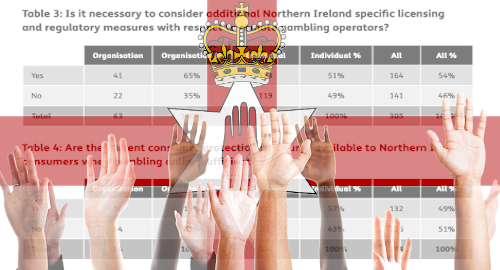 Northern Ireland’s gambling options appear in for major expansion following the publication of a public consultation that found major fault with the status quo.
Northern Ireland’s gambling options appear in for major expansion following the publication of a public consultation that found major fault with the status quo.
This week, Northern Ireland’s Department for Communities (DfC) released the results of the public consultation it launched last December to gauge the public’s attitudes towards the current gambling regime. The results, highlights of which were previewed in September, show broad support for loosening the current limits while ensuring adequate consumer protections.
The survey was conducted online and attracted only 382 responses from a mix of individuals and organizations, so it could be a stretch to say that the results are truly representative of the population as a whole.
Nevertheless, after being briefed on the findings, the NI Assembly’s Committee for Communities wrote to the Minister for Communities saying it “favors new NI specific gambling legislation.” Ideally, this would include authorizing land-based casinos, online gambling, poker in clubs and the creation of a “wholly independent regulatory body for gambling here.”
Around 63% of respondents want Northern Ireland to finally permit legal casino gambling, although support was higher among individuals than organizations (including most gambling industry groups that responded). Similarly, 60% want to see an end to laws prohibiting playing poker, bingo and other ‘equal chance gaming’ in pubs and clubs.
There was slightly less enthusiasm (54%) for creating bespoke licensing and regulatory measures governing online gambling, possibly because there’s currently no real mechanism in place that prevents local residents from accessing any number of gambling sites based outside Northern Ireland.
That said, respondents were evenly split on whether current consumer protection measures for gambling online were sufficient. Of those who thought the rules were insufficient, the biggest concerns were age verification, self-exclusion and the ability to impose financial limits for online play.
SUNDAY, BETTING SUNDAY
Retail betting shops and bingo halls are currently required to close on Sundays, Christmas and Good Friday, a restriction not imposed on racetracks, gaming machines and the National Lottery.
Two-thirds of respondents said the rules hamstringing betting shops should be relaxed, with unanimous support for opening Sundays, 60% support for opening on Good Friday but only 14% in favor of Christmas betting. Around 65% of respondents supported allowing bingo halls greater opening freedom.
However, 62% of respondents want to keep the current ‘demand test’ for opening new betting shops in neighborhoods that already have a number of retail betting options. This view was far more popular with organizations (94%) than individuals (54%).
As for gaming machines in bookmakers’ shops, nearly two-thirds (65%) of respondents want to increase Northern Ireland’s paltry prize limits – currently a maximum stake of 30p and max payout of £8 – to match the limits in Great Britain’s shops.
The survey found 65% support allowing the machines to accept payment in something other than coins, although this dipped to 33% when it came to using debit/credit cards.
Half of respondents believe betting shops should be allowed to have four (30%) or more (20%) machines each, while 60% feel the maximum number of gambling machines in registered clubs should be based on the size of club membership.
ADVERTISING, PROBLEM GAMBLING
Just over half (52%) of respondents want to see Northern Ireland align its gambling advertising rules with those of Great Britain, while 27% want to see further restrictions applied and 17% want to maintain the status quo. The current laws limit retail bookmaking advertising to ‘hard copy’ only, while gaming ads are permitted only under certain circumstances.
The overwhelming majority (97%) of respondents believe the gambling industry should help fund problem gambling research, education and treatment, while 84% support the introduction of a mandatory levy on gambling operators to ensure these programs get the needed financing.